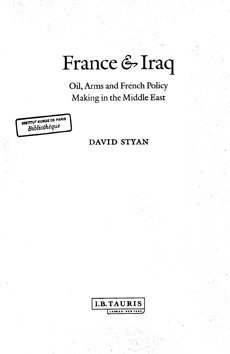|
ACKNOWLEDGEMENTS
The making of this book has been a lengthy process; stretched both geographically between Paris and London, and chronologically across far too many years. The research would have been impossible without the hospitality, support, criticism and encouragement of many colleagues, contacts and friends in France and Britain. Rather than list them all, I simply note my appreciation to several groups of people, without whom this book would not have been written.
Primary thanks go to the many dozens of individuals who agreed to be interviewed in Paris in the late nineties: current and former diplomats, journalists; academics, lobbyists, oil and arms company employees, as well as French and Iraqi students, all gave freely of their time to answer obscure queries from an improbably inquisitive anglais, speaking rather mangled français. While material from specific interviews used in the text is footnoted, my debt to French researchers, journalists and policy-makers runs far deeper than this; it was the encouragement of all of those I first interviewed, and their enthusiasm that their stories be told, that prompted my research.
A more longstanding Parisian debt is to the library staff in rue Sainte-Guillaume; now branded the Bibliotheque de Sciences Po, it is the collections of what is formally the IEP/FNSP library, with its encyclopaedic dossiers de presse and archives, on which much of this text rests. Rarely can library staff have dealt with so many obscure queries with such patience, good humour and diligence, belying the absurd, worn cliche of inhospitable Parisian bureaucrats. The IEP has changed; long-gone are the concierge who dispensed copy cards amidst her ironing, the cramped grenier above rue Saints-Peres, and the hut in the garden of rue Saint-Guillaume; yet the professionalism of the staff remain, for which they deserve fulsome thanks from foreign researchers.
In Paris I was also fortunate to benefit from the support and friendship of colleagues in the Centre d’etudes et de recherch.es Internationales; also now changed from the days of the tranquil garden, rue Chevreuse. Staff of both the Institut Franfais du Pe'troles, and Total were also helpful. Finally in Paris, cosmopolitanism, conversations and hospitality Chez Riché were all priceless.
In London Fred Halliday supervised the thesis on which much of this text draws; Fred, other staff and fellow students in the London School of Economics provided immeasurable support. While I myself proved immune to the theoretical angst of many of those around me, the department of international relations provided a uniquely stimulating environment, combining critical eclecticism, friendship and humour in the years when we migrated from Portugal Street to the Aldwych.
Encouragement and comments from both Charles Tripp and Jolyon Howorth greatly helped improve the original text. The Economic and Social Research Council helped with costs. Colleagues and students in the School of Politics and Sociology of Birkbeck College have been supportive throughout. Despite all the assistance, mistakes will remain for which I alone am responsible.
Finally, I record my debt to a teacher and friend who died as this book went to press; twenty years ago, it was Jean-Franqois Medard who first stirred my critical interest in French foreign policy.
Introduction
This book seeks to understand how and why the French state developed such a close relationship with Iraq’s leaders over the final four decades of the twentieth century. The book first traces the origins and consequences of France’s reorientation of its policy in the Middle East in the 1960s. The end of the war in Algeria in 1962, coupled with President de Gaulle’s increasingly critical stance towards Israel in the mid-1960s, facilitated the reopening of ties with Arab states. This reorientation of policy, which the book terms the ‘reinvention of French Arab Policy’, arose in large part from the role of commercial interests in the formulation of foreign policy. The policy helped French oil companies secure Middle Eastern oil supplies throughout the 1970s. The cost of imported oil was more than offset by increased export earnings from the sale of arms and infrastructure projects to Arab states.
Having established the diplomatic and economic context, the book’s principal focus is the analysis of how France’s bilateral ties with Iraq in particular became so central to French policy in the Middle East. The text traces in detail successive presidential and ministerial ties with Iraqi officials throughout the Fifth Republic. While the roots of the Franco-Iraqi relationship, and indeed the origins of the French oil industry itself, lie in the 1920s, it was from the early 1970s that particularly close ties between the ruling elites in Baghdad and Paris developed. The nationalization of Iraqi oil in 1972 confirmed France’s privileged commercial position within Baathist Iraq’s foreign policy. Personal ties between Saddam Hussein, who visited France twice in the 1970s, and the young French premier Jacques Chirac, clearly played a role in the relationship —as did the rather quixotic diplomatic rhetoric of France and Iraq sharing values of modernising, secular republics. Yet while these aspects have some significance, the book argues that the focus on personalities and diplomatic discourse is of far less importance than the fact that French ties with Iraq and other oil-exporting Arab states were part of a coherent, long-term Gaullist regional policy in the Middle East. The framework of this policy was consciously elaborated and sustained by a generation of French technocrats, politicians, diplomats and writers from the mid-1960s onwards, and was shaped above all by commercial considerations. The success of this framework was demonstrated in the rapid growth in exports of armaments and civil engineering projects, as well as aeronautical and nuclear technology, to Iraq and other oil-rich Arab states throughout the 1970s, under the presidencies of both Georges Pompidou and Valery Giscard d’Estaing.
…..
|
